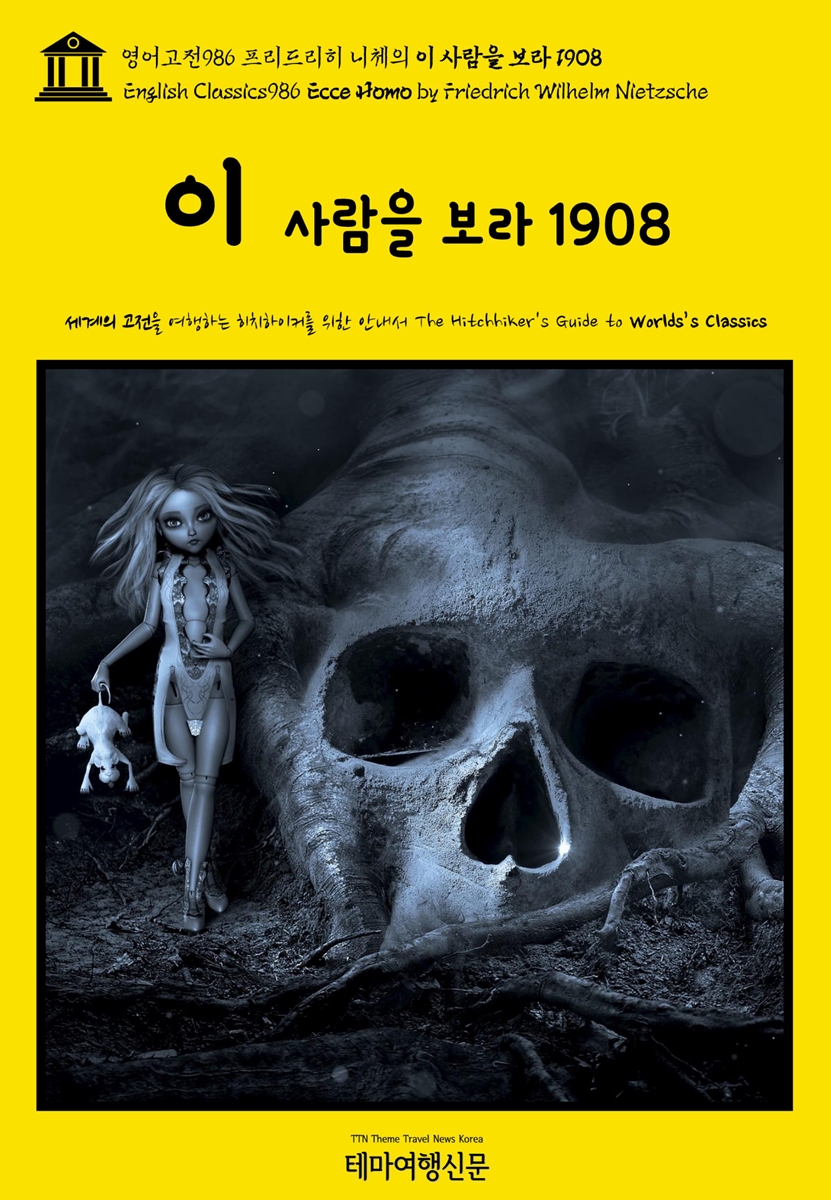▶ 프리드리히 니체의 이 사람을 보라 1908(Ecce Homo by Friedrich Wilhelm Nietzsche)은 프리드리히 니체(Friedrich Wilhelm Nietzsche, 1844~1900)가 1888년 작가가 마지막으로 집필한 작품(the last original book)으로, 사후 8년 후에야 비로소 출간되었습니다. 자신의 철학이 좀 더 대중적으로 다가갈 수 있도록 집필하였기 때문에 기존의 작품보다 상대적으로 쉽게 접할 수 있는 니체 작품으로 꼽힙니다. 부제 사람이 어떻게 사람이 되는가(How One Becomes What One Is). 이 사람을 보라 1908은 차라투스트라는 이렇게 말했다 1883(Thus Spake Zarathustra: A Book for All and None), 선악의 저편 1886(Beyond Good and Evil), 도덕의 계보 1887(The Genealogy of Morals), 우상의 황혼 1889(The Twilight of the Idols) 등과 함께 니체의 후기 저작에 속합니다.
▷ 번역자 서문(Translator's Introduction)과 작가 서문(Preface)을 제외하고, 20장으로 구성되어 있으며, 내가 현명한 이유(Why I Am So Wise), 내가 똑똑한 이유(Why I Am So Clever), 내가 이렇게 훌륭한 책을 쓰는 이유(Why I Write Such Excellent Books)와 같이 자아도취적인 제목의 장이 초반부에 배치되어 있습니다. 니체는 작품을 통해 알렉산드리안 학자(Alexandrian academic)도, 아폴론적 현자(Apollonian sage)도 아닌 디오니소스적인 철학자(Dionysian)를 이상적인 인간상이라고 주장하며, 자신의 어린 시절의 삶, 취향, 미래에 대한 비전 등 다양한 주제에 대하여 폭넓은 담론을 진행하였습니다. 테마여행신문 TTN Korea 영어고전(English Classics)과 함께 어제도, 오늘도, 내일도 멋진 문학여행을! B
▶ TRANSLATOR'S INTRODUCTION. Ecce Homo is the last prose work that Nietzsche wrote. It is true that the pamphlet Nietzsche contra Wagner was prepared a month later than the Autobiography; but we cannot consider this pamphlet as anything more than a compilation, seeing that it consists entirely of aphorisms drawn from such previous works as Joyful Wisdom, Beyond Good and Evil, The Genealogy of Morals, etc.
▷ 번역가 서문. ‘이 사람을 보라’는 니체가 마지막으로 쓴 산문 작품입니다. 팸플릿 ‘니체 대 바그너’가 자서전보다 한 달 늦게 준비된 것은 사실이지만, 이 팸플릿이 전적으로 '즐거운 지혜', '선악을 넘어서', '도덕의 계보' 등의 이전 작품에서 끌어낸 격언들로 구성되어 있다는 점에서 우리는 이 팸플릿을 편찬물 이상으로 간주할 수 없습니다.
▶ Coming at the end of a year in which he had produced the Case of Wagner, The Twilight of the Idols, and The Antichrist, Ecce Homo is not only a coping-stone worthy of the wonderful creations of that year, but also a fitting conclusion to his whole life, in the form of a grand summing up of his character as a man, his purpose as a reformer, and his achievement as a thinker.
▷ ‘바그너의 경우’, ‘우상의 황혼’, 그리고 ‘안티크리스트’를 집필했던 한 해의 끝자락에 다가오는 ‘이 사람을 보라’는 그 해의 멋진 창조물에 가치가 있을 뿐만 아니라 인간으로서의 성격, 개혁가로서의 목적, 그리고 그의 삶 전체에 적합한 결론의 형태로 다가옵니다. 사상가로서의 성취입니다.
▶ WHY I AM SO WISE. The happiness of my existence, its unique character perhaps, consists in its fatefulness: to speak in a riddle, as my own father I am already dead, as my own mother I still live and grow old. This double origin, taken as it were from the highest and lowest rungs of the ladder of life, at once a decadent and a beginning, this, if anything, explains that neutrality, that freedom from partisanship in regard to the general problem of existence, which perhaps distinguishes me.
▷ 내가 현명한 이유. 내 존재의 행복, 아마도 그 고유한 성격은 그 운명성에 있습니다. 수수께끼로 말하자면, 나는 아버지로서 이미 죽었고, 어머니로서 나는 여전히 살아 있고 늙어갑니다. 말하자면 인생의 사다리의 가장 높은 단계와 가장 낮은 단계에서 취한 이 이중 기원은 퇴폐적인 동시에 시작이며, 오히려 이것이 존재의 일반적인 문제에 관한 당파성으로부터의 자유, 즉 중립성을 설명합니다. 아마도 저를 구별합니다.
▶ WHY I AM SO CLEVER. Why do I know more things than other people? Why, in fact, am I so clever? I have never pondered over questions that are not questions. I have never squandered my strength. Of actual religious difficulties, for instance, I have no experience. I have never known what it is to feel "sinful." In the same way I completely lack any reliable criterion for ascertaining what constitutes a prick of conscience: from all accounts a prick of conscience does not seem to be a very estimable thing....
▷ 내가 똑똑한 이유. 나는 왜 남들보다 더 많은 것을 알고 있을까? 사실 나는 왜 그렇게 영리한가? 나는 질문이 아닌 질문에 대해 고민해본 적이 없습니다. 나는 내 힘을 낭비한 적이 없습니다. 예를 들어 실제 종교적 어려움에 대해서는 경험이 없습니다. 나는 "죄"를 느끼는 것이 무엇인지 결코 알지 못했습니다. 같은 방식으로 나는 무엇이 양심에 가책을 구성하는지 확인하기 위한 신뢰할 수 있는 기준이 전혀 없습니다.
▶ WHY I WRITE SUCH EXCELLENT BOOKS. I am one thing, my creations are another. Here, before I speak of the books themselves, I shall touch upon the question of the understanding and misunderstanding with which they have met. I shall proceed to do this in as perfunctory a manner as the occasion demands; for the time has by no means come for this question. My time has not yet come either; some are born posthumously.
▷ 내가 이렇게 훌륭한 책을 쓰는 이유. 나는 하나이고 내 창조물은 다른 것입니다. 여기에서 책 자체에 대해 말하기 전에 책이 직면한 이해와 오해에 대한 문제를 다루겠습니다. 나는 필요에 따라 형식적인 방식으로 이 일을 계속할 것입니다. 왜냐하면 이 질문을 할 때가 결코 오지 않았기 때문입니다. 내 시간도 아직 오지 않았습니다. 일부는 사후에 태어납니다.






